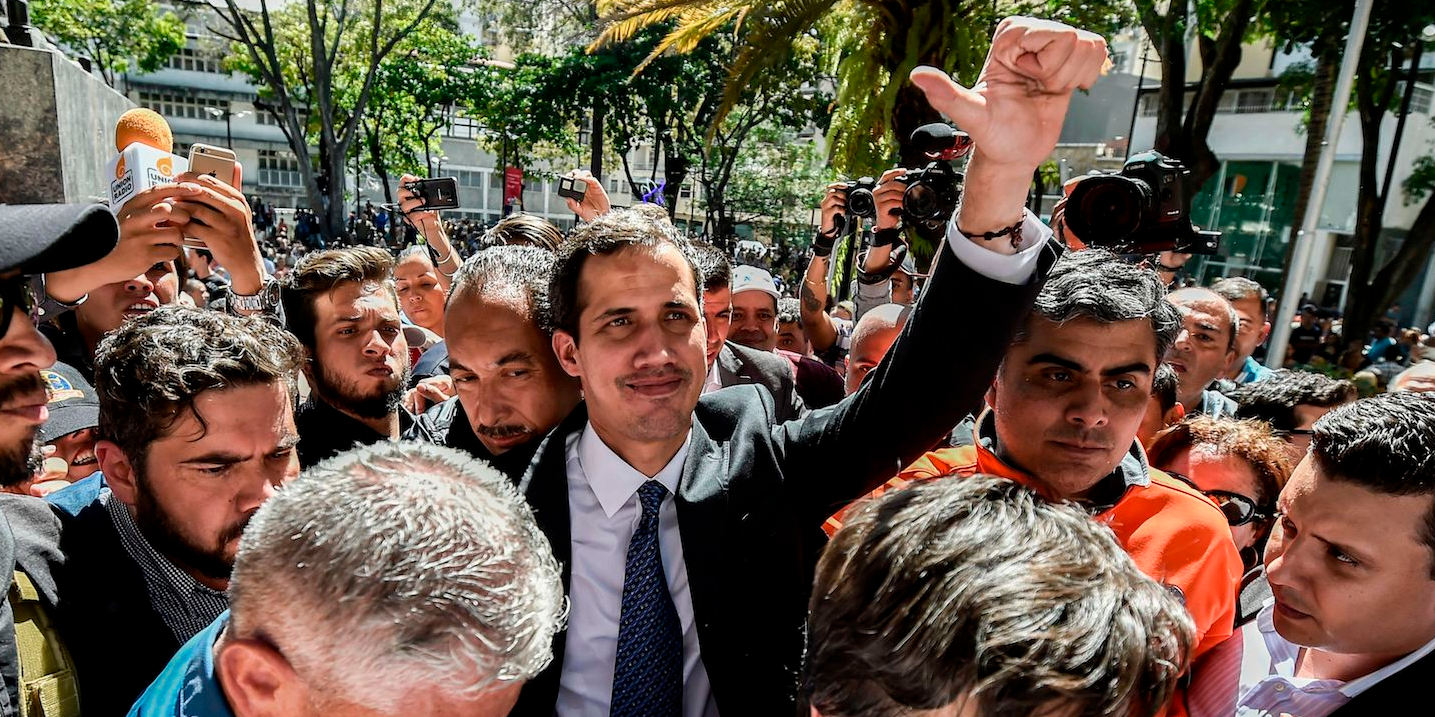- Juan Guaidó is running a campaign to replace Venezuelan President Nicolás Maduro, who he says has lost legitimacy. The US and many other countries are backing him.
- Last week, Guaidó framed his attempt as a three-step process: secure popular support, international support, and Venezuelan military support.
- In his latest public pronouncement – an op-ed article for The New York Times – Guaidó appeared to shift his thinking.
- He restated the importance of international support and support from the Venezuelan people. But instead of emphasizing the military, he restated the importance of Venezuela’s National Assembly, where he is the majority leader.
- Guaidó still acknowledges a need to win over the military, but the change in emphasis is telling.
Juan Guaidó, the Venezuelan opposition leader who last week declared himself the country’s “interim president,” appears to have changed one of his three criteria for taking power from beleaguered President Nicolás Maduro.
Guaidó used to say he needed backing from the Venezuelan people, the international community, and the military to effect a successful transfer of power.
In a Wednesday op-ed article in The New York Times, however, Guaidó appeared to reframe his campaign. He dropped the tough ask of military support, instead talking up the National Assembly.
Guaidó is already the majority leader of the National Assembly, which is Venezuela’s parliament. He stepped up as Maduro’s main challenger this month as massive anti-government protests erupted across the country.

Of the three groups Guaidó previously said he needed support from, according to the Associated Press, the military is the toughest to crack. Since the unrest stepped up, Venezuela's military leaders have pledged their loyalty to Maduro.
It is difficult to measure Guaidó's popular support around the country, but tens of thousands marched in support of him last week.

Guaidó's goalposts
In his op-ed article, Guaidó acknowledged that he still needed "support from key military contingents" and "the military's withdrawal of support from Mr. Maduro" to bring about a change in government.
Yet the article included a shift in emphasis that downgraded military support from a core pillar of his efforts to instead be one of many steps.
The US, the European Union, Canada, and almost all of Latin America have recognized Guaidó as the country's interim president.
Spain, Britain, Germany, and France also told Maduro to call new elections or else they would formally recognize Guaidó as the interim president who would call a new vote.
Maduro's government responded by saying other countries had no "power to issue deadlines or ultimatums to a sovereign people."
Shortly after US President Donald Trump recognized Guaidó as interim president, Maduro told all US diplomats in the country to leave. Washington has refused to obey that order.
Russia, Turkey, Syria, and Cuba are among countries that have pledged support for Maduro.

Crucially, Venezuela's military leaders have pledged their loyalty to Maduro. Since anti-Maduro protests erupted earlier this month, many law-enforcement officers have been raiding neighborhoods around the country and attacking civilians to intimidate Maduro's critics, Bloomberg reported.

Don't call me 'self-proclaimed'
Guaidó also argued against the notion that his ascendancy to interim president was a "self-proclamation." He said that according to Venezuela's constitution, "if at the outset of a new term there is no elected head of state, power is vested in the president of the National Assembly until free and transparent elections take place."
Maduro swore in for a second, six-year term as Venezuela's president on January 10. Critics accused him of vote rigging and say his presidency was unconstitutional and fraudulent.
Guaidó swore himself in as interim president on January 23.
"It was not of my own accord that I assumed the function of president that day, but in adherence to the Constitution," Guaidó wrote in The Times.
He has appeared to exercise that power already. He wrote on Wednesday that he had started appointing ambassadors abroad and "locating and recovering" assets belonging to the Venezuelan government.
Earlier this week he also wrote to UK Prime Minister Theresa May and the Bank of England's governor, Mark Carney, asking them not to grant Maduro access to $1.2 billion of Venezuelan gold reserves at the bank.
He said Maduro would sell the gold and use the money "to repress and brutalize the Venezuelan people."

